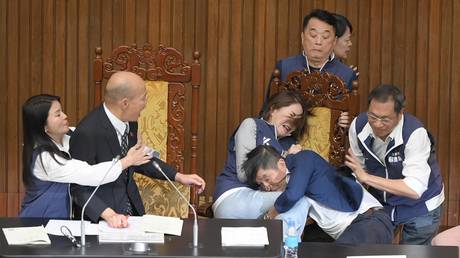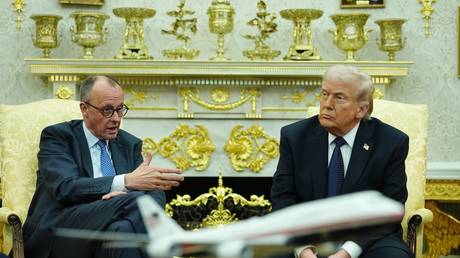
Members of all three parties brawled over reforms to the legislature
A session of the Taiwanese parliament, the Legislative Yuan, descended into a fist fight on Friday, with members suffering concussions, fractures and other injuries.
Lawmakers had gathered to discuss a controversial proposal by the opposition to criminalize officials who make false statements in parliament, and give the legislature more powers to scrutinize the government.
Tensions were running high even before the session, with lawmakers shouting and shoving each other outside the building in Taipei.
Matters escalated further when they got inside the chamber, as members began to lash out with their fists and perform wrestling moves on each other. Videos from the Legislative Yuan showed male lawmakers attacking their female counterparts in several cases.
The brawl appeared to die down at some points, before reigniting with renewed force, and continuing late into the evening.
The scuffles involved members of all three parties – the Democratic Progressive Party (DPP) of president-elect Lai Ching-te, who is to be inaugurated on Monday; the opposition Kuomintang (KMT), which has three more seats in the parliament than the DPP but is unable to form a majority; and the Taiwan People’s Party (TPP), which holds just eight seats.
During the scuffles, a lawmaker for the DPP ended up in hospital after being thrown over a table by his opponents and landing on his head.
At one point, a politician grabbed the draft legislation and escaped from the chamber so that his colleagues could not vote on it.
On Sunday, the DPP said at least eight of its members were wounded in the altercations, including secretary-general Rosalia Wu, who suffered “severe rib cage contusions.” Other lawmakers received injuries including concussion, a tailbone fracture, and a dislocated hand. The party has vowed to go to court over what it said were “atrocities” committed by their political rivals.
READ MORE: EU will not recognize Taiwan – Borrell
The DPP has been accusing Kuomintang and the TPP of “an unconstitutional abuse” of their position in trying to push through proposals without a customary consultation process. The opposition, however, insists that Lai’s party is trying to “monopolize power” on the self-governed island – viewed by China as part of its sovereign territory – by resisting the changes.




